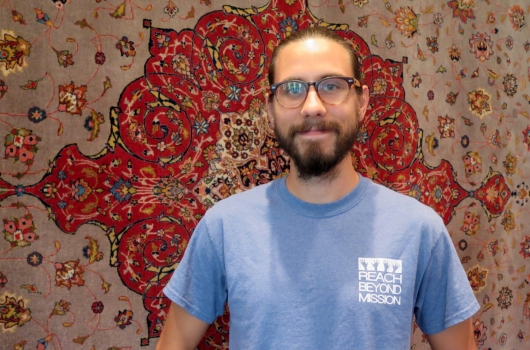Creating Cultures of Inclusion
 NBA Incubate SENT Seminar Participant Christopher Endress
NBA Incubate SENT Seminar Participant Christopher Endress
In September 2017, the NBA Incubate Initiative hosted the 2017 SENT Seminar: Equipping Social ENTrepreneurs for Leadership and Change, in Leavenworth, Kansas. Designed for Disciples and their leadership teams who are starting new health and social services ministries, the SENT Seminar covers the basics of nonprofit ministry startups, as well as skills for leadership and change in our global and faith communities. Topher Endress, Faith and Disabilities: A Congregational Guide, attended as a 2017 SENT Seminar Participant and shares this reflection.
There are so many words we use to label people with disabilities: handicapped, special needs, disabled, differently-abled, limited, marginalized, etc. The list could go on and on, especially if I added the more offensive names to the list. Why is that?
I think it’s two-fold. For starters, humans just love to define and label things. Our minds are geared for pattern recognition, and it’s frankly a lot easier to anticipate needs if we can assign a label and group people together. But also, it’s important because we all want to be known. It can be comforting to see someone else with your label – they are like me, they get it, I’m not alone.
People have different reasons for their preferences with titles and labels. Some may prefer “autistic,” while others want to be “a person who uses a wheelchair.” Some are fluid, changing their preference based on context. Other slowly morph over time.
If there is one thing I learned from the NBA’s SENT Seminar, it was a similar lesson – what we call ourselves matters a great deal, but it is never static. I entered the weekend already emboldened as a theologian to speak about the right-ness of disability inclusion, but had to learn as well, that being called ‘CEO,’ ‘President,’ or ‘Director of Marketing,’ are no less forms of ministry.
As I lean into work with churches, coaching and teaching them about creating cultures of inclusion, I have to pick titles. Maybe I’ll be a consultant. Maybe a minster. Maybe a prophet. Maybe all of these. If my goal is to see churches widen their walls so as to include all people, whether they use the label disabled, differently-abled, handicapped, or whatever, I’ll have to see myself as ministering through the different types of work that must be done.
One of the most memorably encouraging moments of my experience was when we collectively worked on our Facebook presence. As someone who takes technology for granted much of the time, and who is frankly kind of bored with Facebook, I was abundantly aware of how others put much more stock into shaping the online image of their ministry. I may have been able to help a few locate the right buttons, but they were able to show me how to look less cynically at the social media world. Their eagerness to share their hopes, mission, and vision stuck with me; building a ministry page online became an act of careful ministry, illustrating God’s calling to a world awash in selfies and targeted ads. What a gift – to see the entire process as a ministry itself!
The SENT Seminar encouraged me to find where God is moving in the midst of blog posts, networking, and document editing. The people I was learning alongside encouraged me to find where God was moving in my own spirit as well. Working side by side with others who so clearly felt God’s calling was an incredible gift, and one that will help shape my own work.
I do not know what I’ll be called in 10 years. But I know that my work, guided by the NBA, will be ministry. And I know that God will be moving in our churches, breaking down the barriers between us, no matter what we call ourselves.
Printer-friendly version here >>
The NBA incubates new ministries, supporting social entrepreneurs of faith who are serving their communities in a variety of innovative ways and empowering these Disciples-led health and social service projects to focus on growth, impact, and sustainability. Learn more at nbacares.org/incubate or by contacting Rev. Ayanna Johnson Watkins, Director of the NBA Incubate Initiative, at awatkins@nbacares.org.